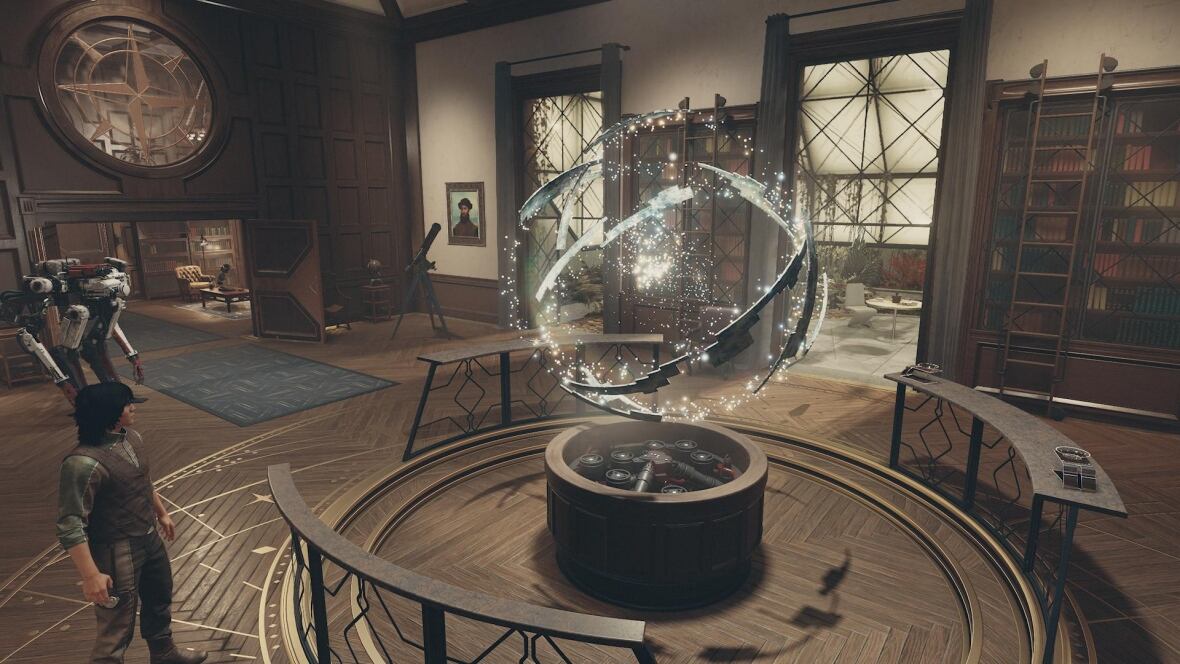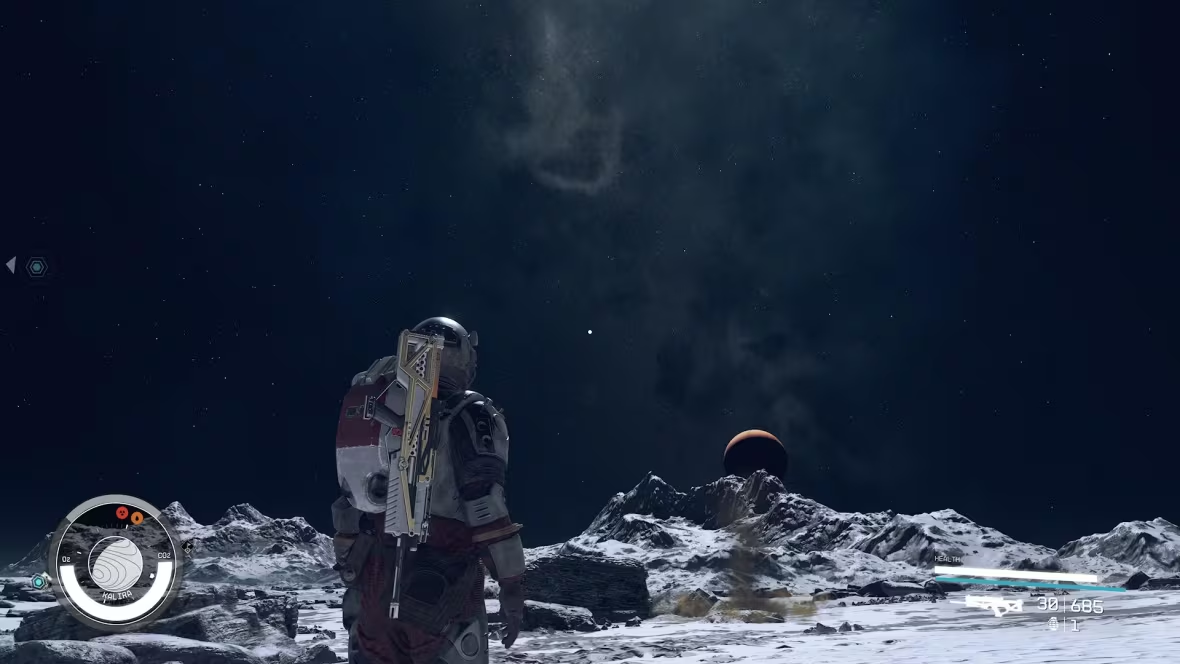Starfield presents a vast world with a sense of wonder — and frequent frustration
Highly anticipated Xbox and PC game offers incredible moments, but opaque mechanics bog things down

About 30 hours into Starfield, the new sci-fi exploration game by Bethesda Softworks, I captured a spaceship essentially by accident, after I took out its space pirate crew in a Han Solo-like shootout.
The problem? My actual ship, a rickety freighter dubbed Frontier, had been teleported away, because I can only have one active ship at a time.
As I arrived at the nearest planet with a large city, the local space cops threw me in jail, because the freshly pilfered craft had contraband onboard.
The episode encapsulates the chaotic nature of playing Starfield. Sooner or later you'll find yourself in a situation not fully explained by its thin tutorials — with no guarantee you'll figure out a solution. But if you can make your way out of it, you'll walk away with a memorable story.
At its core, this is a role-playing game much like Bethesda's previous titles, including Fallout 4 and The Elder Scrolls V: Skyrim. But Starfield also goes further than that with a near-unimaginable scope of content — if they grab the player's interest for that long.
Free reign to explore
You start off as a humble space miner, zapping rocks with a laser cutter, before finding a strange metal shard that gives you a trippy vision of the stars and alien-like symbols.
That attracts the interest of Constellation, an organization whose members are dedicated to space exploration — something considered unusual after a couple hundred years of colonizing planets has made interplanetary travel mundane for most.
After the initial setup, however, you're largely left to do whatever you want, in whatever order.
As Constellation's newest member, you could continue searching for more of those vision-popping artifacts, and encounter several mysteries — but the embargo for this review forbids me from talking about them in detail.
Or you could follow any of the dozens — hundreds? — of quests and missions that will pop up along the way. You could help solve a personal squabble between two rival business owners. Or you could insert yourself into a turf war between two gangs in the cyberpunk city of Neon.
You could also do none of these, and instead survey the hundreds of planets and moons, scanning local flora and fauna to fill your scientific log book.

If that sounds like a lot, that's because it is.
Bethesda executive Pete Hines said during a livestream earlier this year that the game "doesn't really even get going until you finish the main quest." That alone took him 50 hours to complete — and that was after he spent 80 hours doing side quests and miscellaneous exploring.
Chasing stars without a map
More than anything, it's too easy to feel utterly, overwhelmingly lost.
It's too easy to lose track of where you are, what the next mission is, or even what items you're carrying around — with potentially grave implications.
I'll find myself in Akila City, a sprawling frontier town with a space Western theme. The town bustles with citizens going about their business. But without so much as a road map, I get lost trying to find one of its dozen shops or landmarks.

That disorienting feeling becomes dangerous when heavily armed and armoured enemies blend into the silver and grey background of labyrinthine mining stations or research labs. It gets worse when fighting alien beasts that skitter and tumble across the ground without heft or naturalistic gait.
Simple categories like weapons and armour are categorized in your inventory to avoid confusion. But the "Aid" tab dumps everything from medical kits to takeout containers of tikka marsala into one difficult-to-sort list.

(One cautionary note: a sandwich called a "Haligonian" appears to be a donair wrap with lettuce, in violation of Nova Scotian tradition. CBC asked Bethesda's PR team for comment; they have not responded.)
An in-game glossary contains tips on several important systems and controls, but it's delivered via walls of tiny text devoid of visual references. It's like trying to learn how to drive a new car using the instruction manual stuffed in the glove compartment.
Clever narrative, standout companions
If it's such a hassle to play, however, why do I find myself coming back to it every night, playing until late in the evening?
Despite all the stress points, there was always something new to encounter, and it's almost always a surprise.
It could be the short story of a family who moved from New Atlantis, the Starfleet Academy of human settlements, to a tiny outpost on a farming planet two systems away.
Or it could be a derelict space casino whose artificial gravity has died, with trays and empty beer bottles floating in the filtered air.

You'll meet a host of background characters, from hard-bitten mercenaries to well-meaning shop owners. Most of them can be boiled down to a single character trait, then forgotten as soon as they leave your screen.
The better-written ones can impress, like a character actor that appears in a single episode of CSI. But they all move and speak with an eerie stiffness, looking more like marionettes than real people.

Thankfully, that's not the case with your Constellation squad. Each is impressively realized by veteran voice actors and performers, like Firewatch's Cissy Jones or Star Trek: Deep Space Nine's Armin Shimerman. The latter plays Walter Stroud, the team's billionaire financier who's charming enough to be more than just another Elon Musk stand-in.
My favourite so far has been Sam Coe, a space cowboy voiced by Canadian Elias Toufexis. Coe is often caught between his swashbuckling nature, the pressure of living up to his legacy as the descendant of a famous space colonist and his duties raising his young daughter Cora.

The funny thing about a video game as vast in scope and ambition as Starfield is that for every element a player might love about it, there's likely to be another they will absolutely dislike.
That makes it hard to recommend as a purchase to players unfamiliar with the genre, or Bethesda's previous offerings — especially at $90 to $130, depending on whether you get the normal or premium edition stuffed with in-game extra items.
Fortunately, anyone subscribed to Xbox's Game Pass service will get access to it on Day 1 at no extra cost.
So if price isn't a barrier, give it a shot. You might find yourself overwhelmed and bounce off of it within the first few hours. Or you could get sucked into the journey and, despite its irritating design choices, get lost in the stars for the rest of the calendar year.


